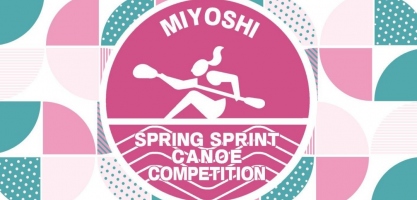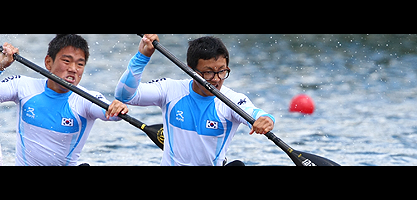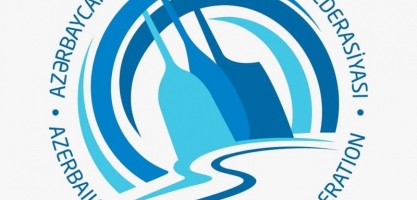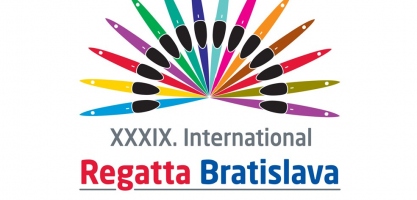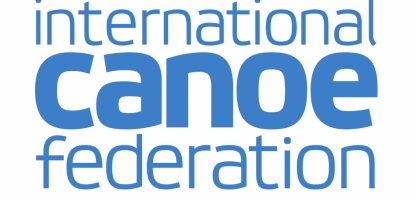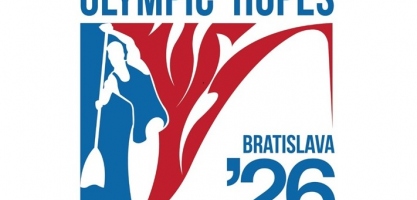What is Canoe Sprint?
Canoe Sprint takes place on a flatwater course and races are contested by two types of boat, canoe (C) and kayak (K). In a canoe, the paddler competes in a striding position using a single-blade paddle, in contrast to the double-bladed paddle used in a sitting position in a kayak. At international level the discipline is competed at four distances from 200m to 5000m, both individually and in teams of up to four. Each discipline is categorised by boat type, number of competitors per boat, gender, and race distance, meaning the example of C2M 500m is the canoe male doubles 500m.
Competitive Canoe Sprint racing dates back to 1869 in Great Britain, but it was more than 50 years until the first international body for paddle sport was formed in Copenhagen, Denmark in 1924. Canoe Sprint made its debut at the Olympic Games in Berlin in 1936 with nine men's events, with that number reduced to eight in London 12 years later to accommodate the first women's race at the Games, the K1W 500m won by Denmark's Karen Hoff. Canoe Sprint has featured at every Games since.
The dominant force in Canoe Sprint is Hungary, winners of 228 world titles in the discipline, nearly 100 more than next-highest Germany with 141. Hungarian Canoe Sprint legend Katalin Kovács has claimed 31 of those crowns - a record for an individual. Her triumphs at the World Championships spanned from 1998 to 2011, across eight different kayak disciplines. This included the K4W 500m, and a notable victory in 1999 when she was a part of the team that beat a German boat including Birgit Fischer, winner of 11 world titles in K4W 500m - a record for an individual in a specific Canoe Sprint event.
Hungary has also won the most medals in Canoe Sprint at the Olympic Games with 86, but neither the leading male nor female gold medal winners in the discipline at the Games is Hungarian. Fischer (8) holds the overall record while Gert Fredriksson (6) of Sweden has won the most gold medals by a male. His tally claimed from 1948 to 1960 makes him his country's greatest Olympian in any sport (summer or winter) by gold medals won.
Things you need to know
- Canoe Sprint is a race to the line on a flatwater course with international competition set over four distances: 200, 500, 1000 and 5000 metres.
- Races are contested as individuals and teams with up to four athletes in a boat.
- Both canoes and kayaks compete in the sprint discipline and are distinguished on the results sheet by their initial letter C and K followed by the number of competitors in the boat, the gender and then the distance. For example, K1M 200m is kayak men's singles over 200 meters.
- In a kayak, the paddler is seated and uses a double-bladed paddle pulling the blade through the water on alternate sides to propel the boat forward.
- In a canoe, the paddle has a single-blade and the athlete uses a striding position with one knee on the deck and the other foot forward allowing room to pull the paddle down their preferred side of the canoe.
- In international competition races are split into nine lanes that are allocated randomly in the initial heats; subsequently lane positions are set by qualification time: five being the fastest to qualify, then six, four, three, two, seven, eight, one and nine.
- The Olympic Games are an exception, with races comprising of eight athletes with the fastest two occupying lanes four and five after the initial preliminary shakeout.
Key milestones
- The first recorded competitive Canoe Sprint racing was organised by John MacGregor (SCO) at the British Royal Canoe Club (RCC) in 1869.
- Transatlantic competition swiftly followed with the New York Canoe Club being founded in 1871.
- Russia hosted the first women's competition, and by the late 19th century Canoe Sprint had a considerable global following.
- The international body for paddle sport, Internationale Repräsentantenschaft Kanusport (IRK), was established in January 1924 in Copenhagen.
- Denmark's capital then played host to the first European Championships on August 19 1933.
- Following the approval of the International Olympic Committee on May 16 1934, Canoe Sprint became an Olympic discipline and debuted at the 1936 Berlin Olympic Games.
- The modern International Canoe Federation (ICF) was established in 1946.
- The 1948 London Olympic Games saw the introduction of the first women’s medals with the K1W 500m class.
- The 2010 ICF Canoe Sprint World Championships was a significant milestone for the sport, with the introduction of C1W 200m, an exhibition C2 W500m race and the inclusion of seven Paracanoe events.
- The 200m distance was introduced at the 2012 London Olympic Games for the K1M, K1W and C1M.
- Canoe Sprint’s Olympic programme has varied a great deal over the years and has changed and adapted in order to improve its global TV appeal and overall standing as well as maximise the use of the latest advances in boat technology.
- The programme for the 2012 London Olympic Games and 2016 Rio Olympic Games consisted of 12 events, eight for men and four for women.
- Tokyo 2020 saw an equal number of events and quotas for men and women for the first time. Women's C1 200 and C2 500 were introduced, replacing men's C1 200 and K2 200.
Additional Information

